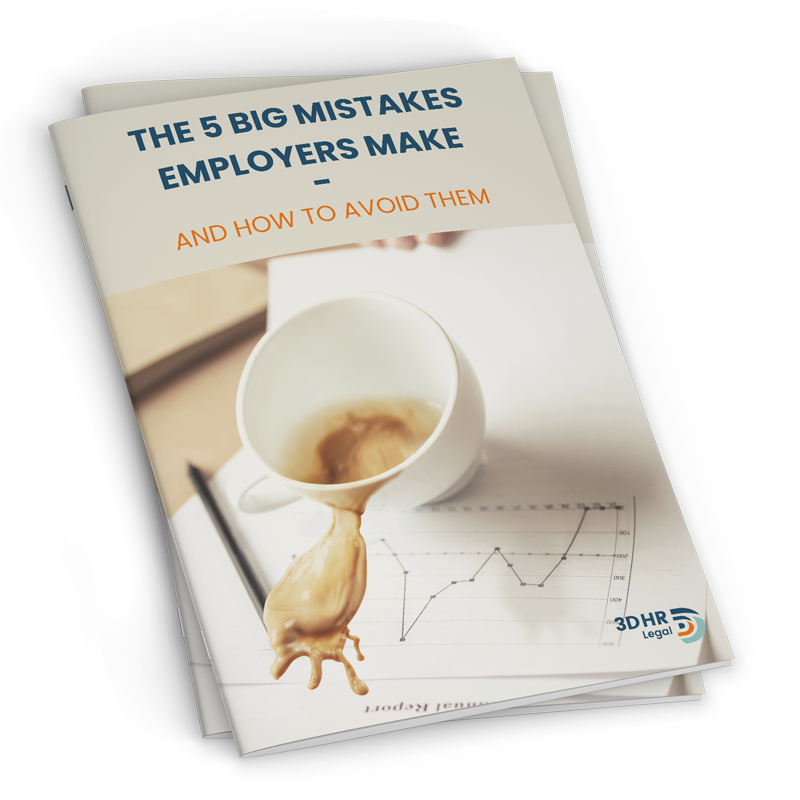The law doesn’t require written employment contracts. So why should you spend time and money on them? Short answer – not having an employment contract is a sure-fire way to land your business in plenty of confusion and hot water. If you need some convincing, here are the three top things that can go wrong.
1. Inability to prove terms in employment contracts
Thought you had a probationary period in place? Thought you had an agreement regarding wage rates or accrual of time off in lieu? How are you going to prove it?
Without a written employment contract, it will be difficult to prove the terms you have agreed with your employees. Verbal communication often results in those involved remembering two different versions of the same conversation. When it comes to terms of employment you can’t afford to have your employee with a different understanding to yours. You need to make sure everyone is on the same page and clear about what’s included and what’s not.
It’s amazing how quickly an employee’s recollection can change when a relationship sours.

Example: Probation period
Do you want to include a probationary period in the employment? If so, you need to specifically agree this with your employee as there is no law in Australia requiring or implying a probation period.
Why is it worth putting in writing? The existence of a probation period can be used in a defence to an unfair dismissal claim and affect the amount of notice required on termination. You need a written record to prove the length of the probation period, what notice period applies during termination (as it can be different after probation) and options for extending the probation.
Example: Wage rates
You cannot combat Award requirements by paying an “all-inclusive” salary or wage rate, unless you have an agreement in writing as required under the relevant Award. If you don’t have such an agreement, you may be ordered to pay overtime and penalty rates that you believed were covered in the higher ordinary hourly rate.
Also, it is not enough to simply tell someone they will be paid in accordance with the relevant Award, unless you are matching the Award word for word. For example, if you pay a higher hourly rate for ordinary hours than provided in the Award, do you then use that rate to calculate overtime and penalty rates? Or do you use the lower Award rate for those calculations? All of this confusion can be avoided by having a written employment contract.
There are significant penalties for getting minimum terms and conditions wrong. A breach of an Award can attract a penalty of up to $54,000 for corporations, and $10,800 for individuals (including sole traders, directors and HR professionals). Having a written employment contract will reduce the risks of getting it wrong, and will ensure that you set up correct accounting practices and record keeping requirements.
2. Unintended terms implied into your employment contracts
Putting things in writing prevents unwanted terms being implied into verbal employment contracts.
A common implied term is the notice period required on termination of employment.
The Fair Work Act 2009 (Cth) requires an employer to provide between 1 and 5 weeks of notice.
However, if you haven’t specified the amount of notice you need to give to an employee on termination, the Courts may imply “reasonable” notice beyond the Fair Work Act requirements. Some cases have found this to be as high as 6 or 12 months notice in the case of senior managers with a long employment record. If you don’t provide this “reasonable” notice, an employee can sue you for payment in lieu of notice.
An added benefit to having a clear termination provision written in your employment contracts, is the ability to include requirements during notice such as gardening leave.
3. Employees leaving and poaching your clients and staff
It’s always devastating to meet a business owner and hear a horror story of an employee who has resigned, promptly set up a business in competition and then “stolen” clients from the ex-employer.

There is no law prohibiting an employee from doing this.
If you want to protect your client relationships, especially in high personal relationship industries, then you need to have written employment contracts that prohibit an employee from taking certain actions when employment ends. This is called a restraint of trade.
A restraint is usually expressed to be for a specific period of time (say 3 or 6 months), and often within a specified area (say within 10 kilometres of the business owner). Restraint of trade terms can restrain an employee from working for competitors, soliciting your clients, soliciting your employees, contractors or suppliers, or accepting work from your clients.
Restraints of trade are enforceable. In order to make sure you have the best chance of success, the restraint needs to be clear and for the minimum time and area needed in order to protect your legitimate business interests.
Getting Help
Contact Jo Alilovic and Sam Lyon of 3D HR Legal if you would like to create written employment contracts, or have a review of your current contracts to ensure they meet legal requirements and protect your business interests. We will help you create employment contracts that put into writing the terms of employment that apply in your workplace, are tailored to suit your business needs, and protect you from business disruption and legal claims.


2 Responses
Great article. Thank you.
Great information in this article – so important to get these things right from the start!